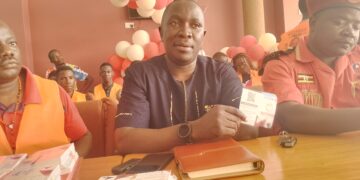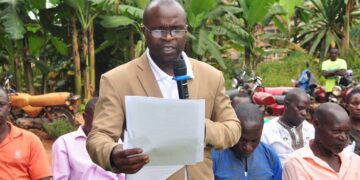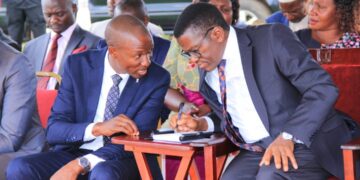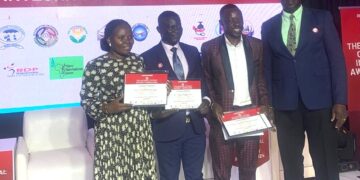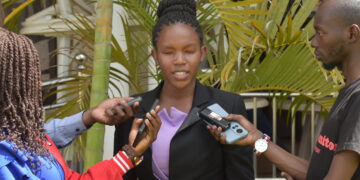National Unity Platform (NUP), Uganda’s largest opposition political party, has made a dramatic U-turn and agreed to join the Interparty Organization for Dialogue (IPOD), a move that will allow it to benefit from government political party funding.
This decision, confirmed through a letter signed by NUP Secretary General David Lewis Rubongoya, comes after months of defiance and legal battles over controversial amendments to the Political Parties and Organisations Amendment Act 2005.
Rubongoya stated that the party is ready to sign the memorandum of understanding required to formalize its membership in IPOD — a development that underscores how financial realities have forced a rethink of NUP’s earlier hardline stance.
A Law that Changed the Game
In May 2025, Parliament passed amendments to the Political Parties and Organisations Act, spearheaded by Faith Nakut, the Woman MP for Napak District.
The amendments made IPOD membership a prerequisite for accessing political party funding from the government.
MPs argued that the move would encourage structured dialogue, foster political tolerance, and strengthen democratic engagement among parties represented in Parliament.
Parliament’s Legal Committee also emphasized that tying funding to IPOD membership would compel political parties to adhere to the Code of Conduct, promoting peaceful coexistence.
The amendments, however, were met with fierce resistance from NUP leadership. Party president Robert Kyagulanyi Ssentamu, popularly known as Bobi Wine, dismissed IPOD as a political tool to “legitimize President Museveni.”
“We shall never join IPOD because it was meant to legitimize Museveni. He wants to take pictures with us and then go around and say he is legitimate because he even sits with his opponents,” Kyagulanyi said at the time.
Following the passage of the law, NUP sued the Attorney General, arguing that the amendments were unconstitutional and lacked proper stakeholder consultation.
From Courtroom to IPOD Table
Tensions escalated in September when NUP was excluded from the IPOD summit at Kololo Independence Grounds, chaired by President Yoweri Kaguta Museveni.
Rubongoya protested the party’s exclusion in a strongly worded letter to the Electoral Commission of Uganda, insisting that as members of the National Consultative Forum (Uganda) — of which IPOD is a constituent branch — they had a legal right to participate in all related processes.
Even as they pursued their legal challenge, reality struck last week when the Electoral Commission disbursed over UGX 9.8 billion to six political parties, leaving out NUP.
The beneficiaries included the National Resistance Movement, Forum for Democratic Change, Justice Forum (JEEMA), People’s Progressive Party, Democratic Party (Uganda), and Uganda People’s Congress.
NUP’s share — UGX 1.4 billion — was withheld pending their formal entry into IPOD.
The Money Factor
For the past four years, NUP has relied heavily on government funding — receiving UGX 5.6 billion annually — to finance key party activities.
That money has funded party headquarters in Makerere Kavule, as well as regional offices in Iganga and Mbarara.
However, with external funding under scrutiny and contributions from the diaspora dwindling, the party faced increasing financial pressure.
A senior government official who spoke on condition of anonymity stated had tightened oversight of foreign funding to NUP.
“It’s now almost impossible for them to receive any substantial amounts from outside. Some people have had their accounts frozen, and others have been arrested after returning to Uganda,” the source said.
At the same time, domestic fundraising has proven insufficient. NUP MPs are expected to contribute UGX 1 million monthly, but not all of the 57 legislators have been consistent in fulfilling that obligation.
A Calculated Climbdown
Faced with shrinking coffers and increasing political isolation, the NUP leadership opted to comply with the amended law.
“Although the National Unity Platform is currently challenging the referenced amendment before the Constitutional Court, we are cognizant that it is the current and binding law. In light of this, the National Unity Platform would like to sign the MOU,” Rubongoya wrote to the IPOD Council Secretary.
The letter signals a strategic retreat rather than a full ideological shift. NUP insists it has not changed its view of IPOD but recognizes the legal and financial consequences of staying out.
“Definitely, our position on IPOD changed the moment the amendments were passed. We disagree with those amendments, and we have challenged them in court. But until the matter is decided, we will abide by the prevailing law,” Rubongoya clarified.
What Next for IPOD?
The decision now lies with the IPOD Council, made up of Secretaries General from all member parties. Lawrence Sserwambala, the Council Secretary, confirmed that discussions on NUP’s admission will be held soon.
“We shall sit in the coming days to deliberate on the matter,” Sserwambala said, without giving a specific date.
If admitted, NUP will regain access to its withheld UGX 1.4 billion share and resume full participation in IPOD activities — a move that could reshape Uganda’s opposition politics ahead of the 2026 general elections.
For now, the party’s move is being read by analysts as a pragmatic concession driven by survival instincts rather than political reconciliation.









